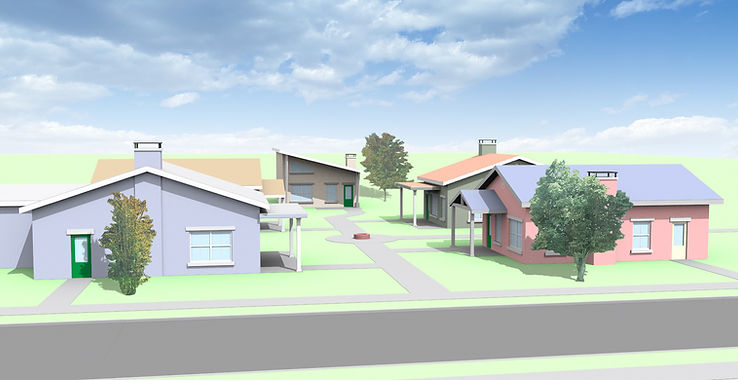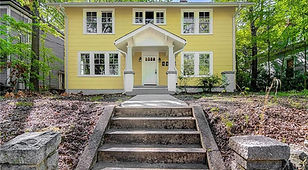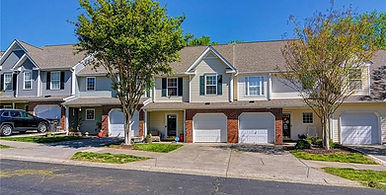
HOUSING
Throughout the development of Forward 2045, residents voiced concerns about the rising cost, and diminishing availability, of housing in Winston-Salem and Forsyth County. One of the key elements of the regulation of housing supply and choice is the Unified Development Ordinance (UDO), which determines the type and quantity of housing allowed on different parcels of land. Making changes to the UDO is one of the most effective ways to address the community’s housing challenges.
RESIDENTIAL DEVELOPMENT

RESIDENTIAL HOUSING UNIT TYPES
On Same Lot


Duplex: Two housing units in one building

Triplex: Three housing units in one building

Quadruplex: Four housing units in one building
Apartment/Condominium: Five or more housing units in one building
On Separate Lots

Detached Single-Family: One detached housing unit on separate lots

Twinhome: Two attached housing units on separate lots

Townhome: Three or more attached housing units on separate lots
HOUSING FACTS TO KNOW
-
Per State legislation, local governments cannot require design or aesthetic elements for single-family or two-family dwellings and townhomes (any structure subject to NC Residential Code). There is an exception for buildings in designated local or national historic districts or local and national historic buildings/landmarks.
-
The State does not allow inclusionary zoning regulations that require a portion of a residential development to be set aside for low-income individuals and families. An elected body can require a percentage of affordable units in projects seeking local funding as part of the financing agreement.
-
Planning staff and the City-County Planning Board do not consider the occupancy status (owner occupied or rental) of residential projects when considering approval or denial of a project or recommendation for approval or denial.
-
Planning staff and the City-County Planning Board do not consider the market value of residential projects when considering the approval or denial of a project or recommendation for approval or denial.
-
If a property is zoned for the desired use and meets the requirements of the Unified Development Ordinances (UDO) and City or County Code, planning staff and elected bodies cannot deny the project.
-
Not all housing projects require a public hearing. Subdivisions and Planned Residential Developments (PRDs) only require City-County Planning Board review, which does not include a public hearing or public comment.
-
The UDO currently contains a provision allowing for a density bonus of 25 percent when a development includes affordable housing units. However, it has never been used.
-
Single-family residential is the most prominent land use in Forsyth County. The most prominent residential zoning district in Winston-Salem, based on both number of parcels and acreage, is RS-9 which has a minimum lot size of 9,000 square feet. This is equal to a density of 4.84 dwelling units per acre. The most prominent residential zoning district in the unincorporated county, based on number of parcels, is RS-20, which has a minimum lot size of 20,000 square feet. This is equal to a density of 2.18 dwelling units per acre. Based on acreage, the most prominent residential district is RS-40, which has a minimum lot size of 40,000 square feet or a density of 1.09 units per acre.
-
All petitioners seeking the rezoning of a parcel adjacent to residentially zoned lots must complete some form of public outreach, be it neighborhood meeting, door-to-door correspondence, or letter with project description and contact information.
-
Property owners do not need any type of permit to timber their land if the tree stumps are left in place. If the tree stumps are removed, an Erosion Control Permit is needed. Timbering land is a private property right.
-
The City and County governments have no control or say over matters involving Homeowner Associations (HOAs).
-
There is no height limit for buildings within Downtown Winston-Salem. However, the NC Building Code requires more substantial construction materials when a building has more than three stories above the ground story(s). These materials drastically increase the cost of a project.
-
The UDO does not have a minimum square footage requirement for residential units. However, the Winston-Salem Housing Code does have minimum space requirement of 320 square feet for housing units. The Housing Code is not administered or enforced by the Planning and Development Services Department. Regarding tiny homes, they must meet NC Building Code requirements to be built on residential lots. Otherwise, they are treated as a Recreational Vehicle (RV) and are only permissible in zoning districts that allow RVs/RV lots.
-
Modular homes are treated similarly to stick-built homes and must meet the NC Building Code requirements. Manufactured homes are treated differently and are subject to the NC Insurance Code requirements not the NC Building Code.
-
The NC Code Council oversees the NC Building Code. Planning and Development Services staff administer and enforce the code. Staff, City Council, or the County Commissioners do not have the authority to change the code.
PUBLIC INPUT

Between August 26 and September 4, 2025, the Planning and Development Services Department held five public meetings to gather input on possible changes to the UDO related to housing. An online survey was also made available to residents that were unable to attend a meeting. In total, 75 people attended the meetings and 252 people took the survey. Below are links to the gathered input. This information will be used to assist staff in developing draft amendments to the UDO regulations.
Review Public Meeting Results
Review Additional Comments Submitted During Meetings
